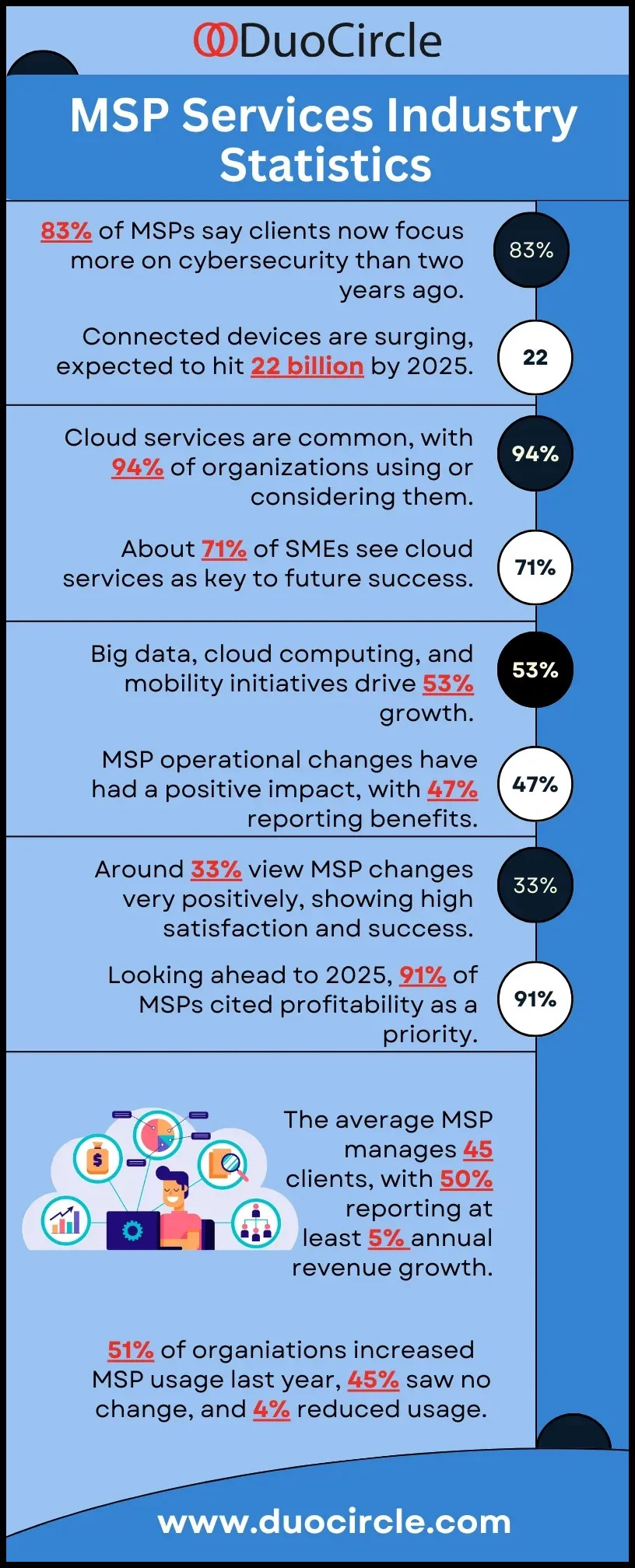The global managed services market is expected to hit $274 billion by 2026. With over 40,000 operational managed service providers (MSPs) in the US alone, there can be intense competition among providers at times. If you are an MSP business or plan to offer managed email security, this article discusses some crucial aspects of managed service offerings to help you do a profitable business.
Expectations & Challenges Faced By MSPs
A Kaseya study reports that 95% of organizations switch their MSSP when unsatisfied with services. Customers often expect MSPs to come with a range of features, like affordability, reliability, accessibility, efficacy, etc. Choosing to focus on merely one or two of these features and overlooking the others will certainly not help you stay ahead of the competition. Managed services offerings should cater to organizations’ evolving expectations and needs, more and more of which are going online every day.
While the clients expect MSPs to operate quickly and deliver their best services at all times, it is not easy to manage an MSP. Almost all types of managed services providers face challenges, and they can be diverse – from being understaffed to not being able to market themselves well and reach the target audience.
Growing Demand for Models Such as Email Security-as-a-service
The rate at which adversaries compromise corporate networks using emails as an attack vector is alarming. Hence, the digital world is witnessing a rapid surge in organizational subscriptions with email security service providers now more than ever before. If you are an MSP or are looking for investment opportunities in MSPs, then email security as a service is one domain with a sizable potential in the forthcoming future. MSSPs need to strengthen their email security services by adopting a security-centric approach.
The Five Essentials For Your MSP Business
Five crucial aspects of becoming a successful MSP are:
- Security: Trust is the most critical factor driving any organization to hand over its affairs to an external party for management. And to gain that trust, an MSSP must be strong in its security aspect. Without a guarantee of robust and fool-proof security, no organization would be ready to transfer its responsibilities to an MSP. Jeopardizing data security by allowing an insecure agency to handle it will be the last thing any organization would want.
- Reliable and Efficient IT Team: Cybersecurity is one field that constantly remains understaffed, with significant positions going unfilled. The scenario is not much different with MSPs. They struggle to find the right members and expand their team of round-the-clock managed service professionals. Thus, an MSP should give importance to creating a reliable and efficient IT team that can instantly address customers’ troubles and facilitate remote IT services.
- Scalability: All organizations aspire to scale their services and resources based on the fluctuating demands of the market. If MSPs can provide an accessible mode of scaling resources up and down, half their work for user acquisition is done. To take care of this aspect, MSPs need to incorporate automated tools that can be upgraded and reconfigured as and when required. When MSPs work towards becoming a powerhouse with best-in-class solutions and tools, they can scale confidently.
- Standardized Operations: People like stability and can look back and recall the niches in which they invested. One significant advantage of standardizing your operations is winning over this bunch of people who aren’t necessarily after brand names but look for services. Having a consistent list of functions clients can expect from you increases your chances of being noticed and considered by those who need those services. Experimenting and expanding the types of managed services you provide is, of course, welcome, more so because of the standard scaling requirements. However, scaling should always be accompanied by some standardized operations.
- Robust Management: An MSSP’s job is not limited to providing IT services like network security, issue resolution, and IT asset management of organizations. A managed service offering must be able to handle the varied requirements of an organization and provide them with customized services to meet the needs of each client. One might argue that one cannot customize one’s services with standardized operations in place, but that’s where one is wrong. What makes standardized processes stand out is the individualization you introduce as an MSP, which can be achieved via hybrid environments, efficient employees, automated tools, quick response and follow up, etc.
Key Aspects To Consider If You Want To Offer Managed Email Services
Since MSPs are the IT experts organizations hire to manage their IT infrastructure round the clock, they must deliver vital services. Some of these aspects that MSSPs must consider are:
- Email Security: Email security is one of the organizations’ primary aspects when subscribing to an MSP. In addition to providing quick threat detection, response, and disaster recovery, MSSPs need to aim higher and include data backup, cloud storage, and security features to customers. A multi-layered email security service offering must consist of cloud backup, so no confidential client data is ever lost.
- Email Marketing Services: Since organizations rely heavily on marketing emails to keep their customers coming back, they need to send out emails regularly. Many organizations try to outsource their email campaigns to increase their efficiency. As an MSP aiming for success and increased clientele, you should incorporate MSSPs under your service listings and broaden the scope of offerings.
- Pricing Strategy: Investors looking to invest in MSPs need to consider the pricing policy in earnest as customers usually avail services on a subscription basis. There are several pricing models for MSPs. These include À la carte (where customers can pick only the services they want and pay for them) and All-you-can-eat (where the user can avail of a range of services at comparatively cheaper rates). Other models can include monitoring-only (where those on a tight budget can use only monitoring services) and tiered (where service packages come for prices that increase from tier to tier). Choosing a suitable pricing model is essential, and you can do it by figuring out the middle ground between what’s affordable for clients and what’s profitable to you.
- Exceptional Services: Almost all MSPs today market themselves using 24*7 availability, meager pricing, and reliability as defining features. But to be a successful MSP that can retain its customers, you must include some exceptional services which customers need but can seldom find in an MSP. These can consist of one-to-one guidance, training activities, and anything that can set your offerings apart.
- Strategic Marketing: MSPs looking to enter the market (or perhaps build their identity as an option that organizations prefer) must zero down on some strategic marketing moves and mediums. For instance, Quora is evolving as a great direct response opportunity, and MSPs can try answering the MSP-related questions posed there by people. Having an excellent website with sections for showcasing your clientele and feedback from happy clients can also be helpful marketing moves.
Final Words
It is challenging to build an MSP partner that customers like and subscribe to while several competitors exist in the market. Hence, strategic planning and marketing are of utmost importance. You can also have a look at any successful managed services example, and you will see most of these critical aspects reflected in their operations.


